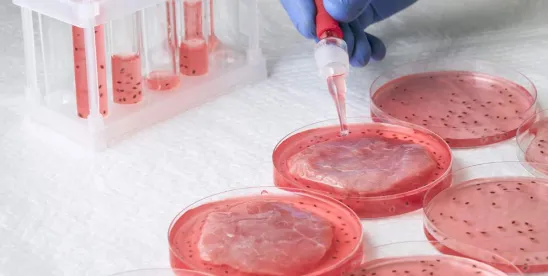The cell cultivated meat industry has had its difficulties with funding, technology and regulatory barriers and the roller coaster ride is not over. In 2021 and 2022, $1.6 billion in venture capital investments went into the alternative meat industry (which included cell cultivated meat). Currently, that amount is down significantly. This decline in funding has led to some cell cultivated meat companies closing and others downsizing and dialing back on their plans to scale up for commercial production. Two of the greatest barriers to cell cultivated meat have been volume or scale (how quickly commercial quantities of meat can be created) and the cost of producing cell cultivated meat. With only two cell cultivated chicken products approved for sale in the U.S. (and Singapore and Israel the only other countries who have thus far approved any cell cultivated meat product for sale), companies producing cell cultivated meats have not had sales to fuel their growth, and, thus, rely heavily on external sources, such as, venture capital, government, industry, and academia, to generate funding.
Boston, Massachusetts has emerged as a leading locale for food tech companies. In 2021, the United States Department of Agriculture (USDA) gave Tufts University a $10 million grant to create the National Institute for Cellular Agriculture (NICA). NICA is part of the Tufts University Center for Cellular Agriculture (TUCCA) and it focuses on research aimed at solving challenging technical obstacles to the development of cell cultivated meat. Last month, the State of Massachusetts and the Massachusetts Technology Collaborative gave more than $2.1 million to NICA to create the FoodTech Engineering for Alternative Sustainable Technologies (FEAST) Center. The FEAST Center will focus on cellular agricultural development. It will provide a fee-based center for cellular agricultural companies to have access to technology and equipment to develop their products, and even provide a test kitchen to assess prototype products.
Another example of a collaborative approach to bring cell cultivated meats to commercial reality is Believer Meats teaming up with the engineering firm GEA. Last month, Believer Meats announced that it had entered a strategic partnership with GEA, one of the largest systems suppliers for the food, beverage and pharmaceutical industry. As this blog has previously covered, Believer Meats is in the process of building the world’s largest cell cultivated meat factory in Wilson, North Carolina. GEA will be working with Believer Meats to develop equipment and processes that lower the cost and increase the efficiency of Believer Meats products, including proprietary bioreactors and processes to permit the recycling of cell culture media. The goal is to be able to increase production to produce commercial quantities of cell cultivated meat at a cost that will be attractive to consumers.
However, despite collaborative efforts like these, cell cultivated meat companies continue to face another great hurdle - regulation. As we previously reported, Florida and Alabama have banned the sale of cell cultivated meat. Other states have considered such legislation without adopting it. Some states have imposed labeling requirements without banning cell cultivated meat. For example, last year Texas passed a law requiring that cell cultivated meat be labeled in a manner that makes it clear to consumers that it is not traditional meat. In May of this year, Iowa passed a law requiring cell cultivated meat to be labeled in a way that distinguishes it from traditional meat or face penalties of $500 -$10,000 per offense. In August of this year, Nebraska Governor, Jim Pillen, issued an executive order requiring cell cultivated meat to be clearly labeled as such and not sold next to traditional meat so that consumers would not mistake the two. He also announced his intention to have a bill introduced during the next legislative session to ban the sale of cell cultivated meat in Nebraska. Further state legislation could be coming.
Potentially much more significant, in June of this year, U.S. Representative Warren Davidson of Ohio introduced the REAL Meat Act of 2024. A prior REAL Meat Act introduced by U.S. Senator Deb Fischer of Nebraska addressed only the labeling of non-traditional meat. However, the REAL Meat Act of 2024 goes further and would prohibit the use of federal funds to support, directly or indirectly, the production, advancement, or enhancement of cell-cultured meat, including through—
- conducting or supporting research on cell-cultured meat;
- supporting meatpacking plants, organizations, or groups relating to
cell-cultured meat; - allowing for the receipt of any assistance or other benefit under a program administered by the Secretary of Agriculture for any product that includes as an ingredient cell-cultured meat; and
- the promotion and advertisement of cell-cultured meat.
The bill, however, includes an exemption for NASA, permitting NASA funds to be used for the development of cell cultivated meat for off planet consumption. While this bill has not made it further than the House Agricultural Committee, the implications are significant. As noted above, the USDA provided the funding to create NICA – which this bill would prohibit. Further, as we previously reported, the FDA and the USDA have been working with cell cultivated meat companies to help them navigate the regulatory process. Since the FDA and USDA are both federally funded, it would seem that such legislation, if enacted, could bring those efforts to a halt and, perhaps, effectively ban the sale of cell cultivated meat in the U.S.
The cell cultivated meat roller coaster ride is not over. It is only a matter of time before collaborations like FEAST and the Believer Meat / GEA partnership will make the commercial sale of lab grown meat feasible by permitting companies to produce sufficient amounts of cell cultivated meat at consumer acceptable prices. The regulatory outcome is not quite so clear.



 />i
/>i

